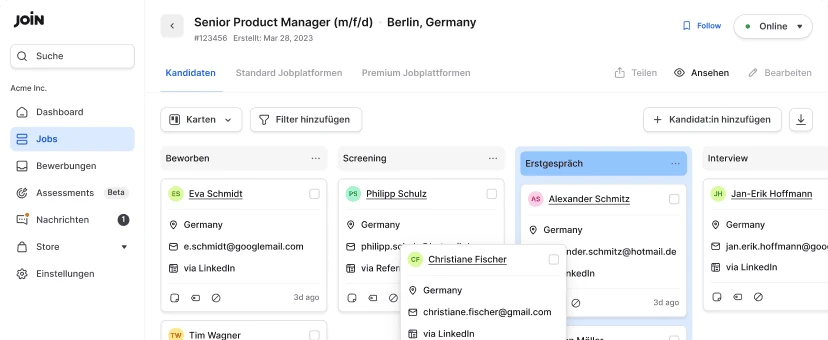Job application form questions: The best pre-screening questions to ask applicants
Table of contents
- Why you should add pre-screening questions to your job application forms
- How many pre-screening questions should you ask in your job application form?
- 10 example pre-screening questions for job applicants
- What to consider when asking questions on a job application form
- Optimising your screening process
You can speed up your hiring process by asking job candidates to answer a few pre-screening questions when they apply for a role. But asking the wrong (or too many) job application form questions might do your process more harm than good.
Table of contents
- Why you should add pre-screening questions to your job application forms
- How many pre-screening questions should you ask in your job application form?
- 10 example pre-screening questions for job applicants
- What to consider when asking questions on a job application form
- Optimising your screening process
To help you get your pre-screening questions right, we’ve prepared a list with some of the best applicant screening questions we’ve come across at JOIN. Asking candidates to answer these questions as they fill out the application form makes it easier for you to more quickly screen and select applicants before moving them into your interview process.
Aside from listing example questions, we’ll also explain some of the best practices to bear in mind when adding screening questions to your job application form. How many pre-screening questions should you ask? And which questions are you legally allowed to ask?
Find the answers to these questions (and more) in our short article below!
- Why you should add pre-screening questions to your job application forms
- How many pre-screening questions should you ask in your job application form?
- 10 example pre-screening questions for job applicants
- What to consider when asking questions on a job application form
- Optimising your screening process
Why you should add pre-screening questions to your job application forms
There’s a good chance you have certain requirements for a role that are non-negotiable. Or perhaps you want to ask a few simple questions that give you a quick idea of whether a candidate is qualified/suitable for the job or not.
That’s where application form questions come in. By asking the right pre employment screening questions in your application form, you can:
- Automatically disqualify candidates that don’t meet essential requirements, such as having the right to work in the country your office is located in
- Limit the number of applications from unsuitable candidates, as applicants are more likely to cancel their application if they notice they don’t meet your basic requirements
- Save time and effort by not having to manually open a candidate’s CV to learn more about whether they meet key requirements
- Speed up your screening process by consistently gathering the same information from each applicant to screen quicker and more efficiently
- Reduce (unconscious) bias by anonymising the initial part of the recruitment process (for more information, check out our article on blind hiring best practices)
How many pre-screening questions should you ask in your job application form?
It’s important to ensure you ask the right questions, and only the right questions. If you ask too many questions, you might end up discouraging potential candidates from applying for your job. After all, time is limited and applicants are no longer willing to jump through all your hoops.
Instead, we found that it is best to ask around two to four targeted questions, rather than confronting your applicants with a long list of questions.
In fact, here at JOIN, we’ve found that one of the best ways to filter out qualified candidates while simultaneously not overburdening them with dozens of questions is to try to collect all essential information in a one-page overview.
This ensures a smooth and fast candidate application flow that minimises the risk of candidate drop-off during the application process.
When using JOIN, you can easily select the screening questions you want to add to your job application form from a list of suggested questions.

10 example pre-screening questions for job applicants
- When are you available to start working with us?
- What is your expected salary range?
- What is your skill level in [insert tool]?
- Are you currently legally permitted to work in [insert country]?
- Do you have a valid [insert type] licence?
- What is your current proficiency in [insert language]?
- Do you currently live in [insert location]?
- How much notice do you need to give to your current employer?
- Are you interested in a full-time or part-time position?
- Are you willing to travel X% of the time for business purposes?
What to consider when asking questions on a job application form
Depending on the country you’re based in, there might be specific rules on the types of pre-screening job application questions you are allowed to ask. But in general, you should steer clear of any questions of a sensitive or personal nature, or questions that might lead to bias seeping into your process.
For example, unless essential for the specific role you’re hiring for, you shouldn’t ask a candidate about their marital status, their sexual orientation, or whether they’re pregnant. In most cases, you’re also not legally allowed to ask whether the candidate has a criminal record.
Of course, there are exceptions. If you’re hiring for someone working in a role working with certain clients/people, there might be legal requirements for your applicants to meet. For example, in certain countries, someone wanting to work at a children’s daycare has to be able to present a certificate of conduct.
That’s why you should always check the legal prerequisites (and limitations) of what type of job application screening questions you are allowed to ask from candidates based on the role you’re hiring for.
Optimising your screening process
The pre-screening job application questions you ask on the application form are just one part of the screening process. Asking the right questions—and the right number of questions—can help you speed up your screening process while also providing an improved candidate experience for your applicants.
For more information on how to improve and optimise your screening process, check out the following articles:
-
- Fair shortlisting made easy
- 5 candidate screening best practices for an effective, automated process
- Hiring a project manager
Frans Lelivelt
Frans is JOIN's multilingual Senior Content Manager. His main topic of interest in the recruitment space is DEI and how companies can reduce their (unconscious) biases to make the world of work a fairer, kinder place for everyone. Outside of work, he tries to do the same for animals, spending much of his spare time in the kitchen preparing plant-based feasts.


